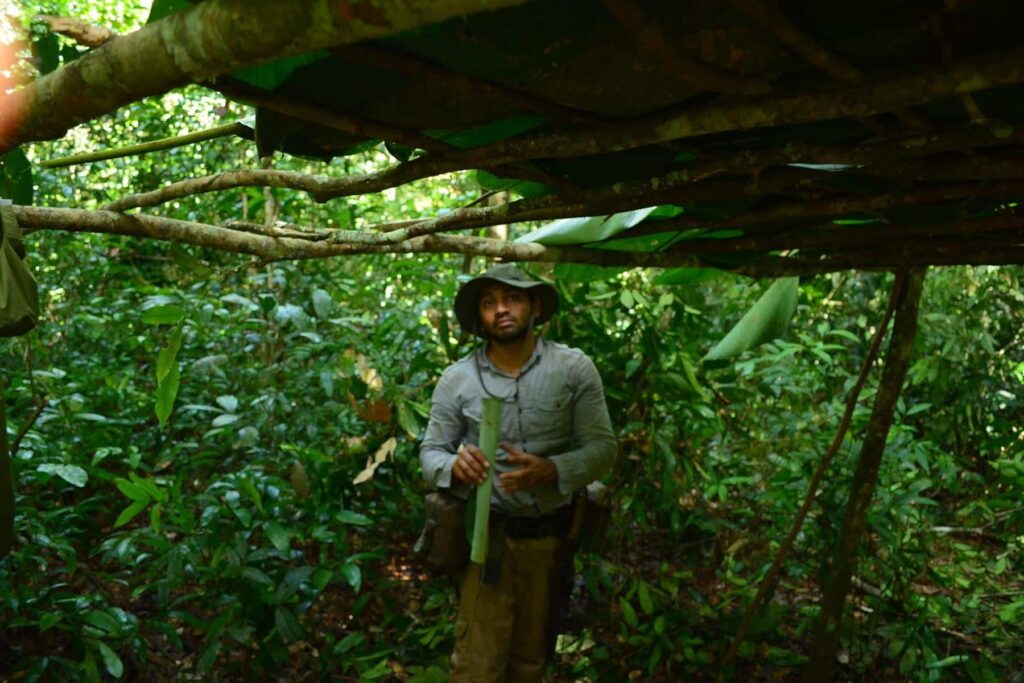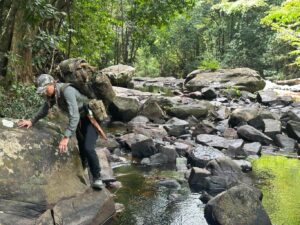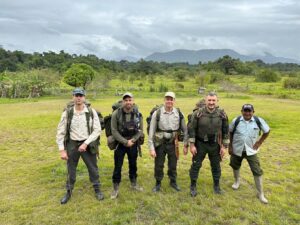
Jungle Survival Skills 101. We at the Wild Tales are jungle survival experts. We teach advanced and basic survival skills to adventure travellers who want to push themselves out of their comfort zones.
Our jungle survival trips start with a rigorous training phase. During this first part of the trip, we’ll teach you everything you need to know to keep yourself safe in a jungle environment – from finding water to sourcing food, making a camp to starting a fire.
When you’re ready, we’ll drop you off in the heart of the jungle entirely by yourself – this isolation phase will let you test your newly gained survival skills in a real-world survival situation. It’s a pretty hardcore way to learn, but with the right mindset, you’ll come out on the other side stronger than ever.
We know that not everyone has the time or inclination to learn these survival skills – but you never know when you might need them. Let’s say you’re going on holiday somewhere and you fancy taking a stroll through the jungle. If you get lost and can’t find your way back, what are you going to do while you wait for rescue?
In a situation like this, knowledge of a few jungle survival basics could save your life. Have a read through the survival skills below and you can ensure you’re ready for anything life throws at you.
INFORM FRIENDS AND FAMILY
If you’re heading into the jungle during a vacation, let your friends and family know where you’re going and for how long you expect to be there. If you don’t come back by a particular time, they should call for a search party to find you.
If you’re travelling alone and journeying into the jungle, the same applies – talk to someone at your accommodation to tell them what you’re doing and where you’re going.
It’s essential that someone is aware of your plans so they can report you missing if you don’t return.
KEEP CALM
If you find yourself in a survival situation, the most important thing to do is remain calm. The right attitude can make all the difference in challenging situations like this.
Take a deep breath and try to assess your situation logically. If you start panicking, things will only become more difficult. Try to make rational decisions that will help you in both the long and short term.
FIND WATER
People can only survive three or four days without water, so it’s crucial that you find a source of clean, safe water as soon as possible. The more dehydrated you become, the more difficult you’ll find it to carry out other basic tasks, so you should make this a real priority.
Animals and birds you encounter might be in search of water themselves. Try following them (from a safe distance!), as they could lead you to water. If you find some, remember to filter it and sterilise it before you drink it – you definitely don’t want to make yourself ill.
Another alternative is to bring a sturdy plastic bag with you in your supplies. Tie it tightly around a leaf or branch to catch the water within the leaves as it starts to evaporate – it will condense in the bag.
Vines can also be a good source of clean water, but it’s essential that you know the difference between a poisonous vine and a safe vine before you cut into it. A poisonous vine will drip a sticky, creamy sap when you cut into it – avoid this! A non-poisonous vine will produce a clear liquid that’s safe to drink.
START A FIRE
Fire is another hugely important part of surviving in the jungle. You can use the flames to boil and sterilise water, to cook food you’ve foraged or caught, to keep you warm and dry at night, and even to deter any animals that might be roaming around.
There are a few simple steps to lighting a fire. It can be a bit tricky if you haven’t done it before, but with practice, it’s a piece of cake.
First up, find a suitable place to light your fire. You want somewhere that’s sheltered from wind and rain, away from the sun, and not close to anything that might catch and spread.
Next, gather some dry wood from the jungle around you. If the wood is even a tiny bit damp, your chances of lighting a fire will drastically reduce, so it’s worth taking the time to find wood that’s bone dry.
Carrying a flint lighter in your pack will make it easier to start a fire. If you don’t have one, though, you can still make a spark that can catch; just create focused friction on your kindling, and this will bring heat to the wood. Take a look at this step-by-step guide to starting a fire without matches – it’s worth practising a few times if you’re planning a trip to the jungle.
LEARN THE ROPES
These are some basic survival skills that we think everyone should know – but the list here is really just the tip of the iceberg.
If you’re keen to learn more about surviving in the jungle (or in any of the Earth’s most extreme environments), book your place on a Wild Tales jungle survival course. We’ll teach you the skills you need to become self-sufficient in the rainforest, and you’ll gain real-world experience that you’re sure to remember if you find yourself in a survival situation.
Fill in our contact form to find out more information or to book onto one of our Amazon adventures. To find out more about Guyana you can visit the GTA.






